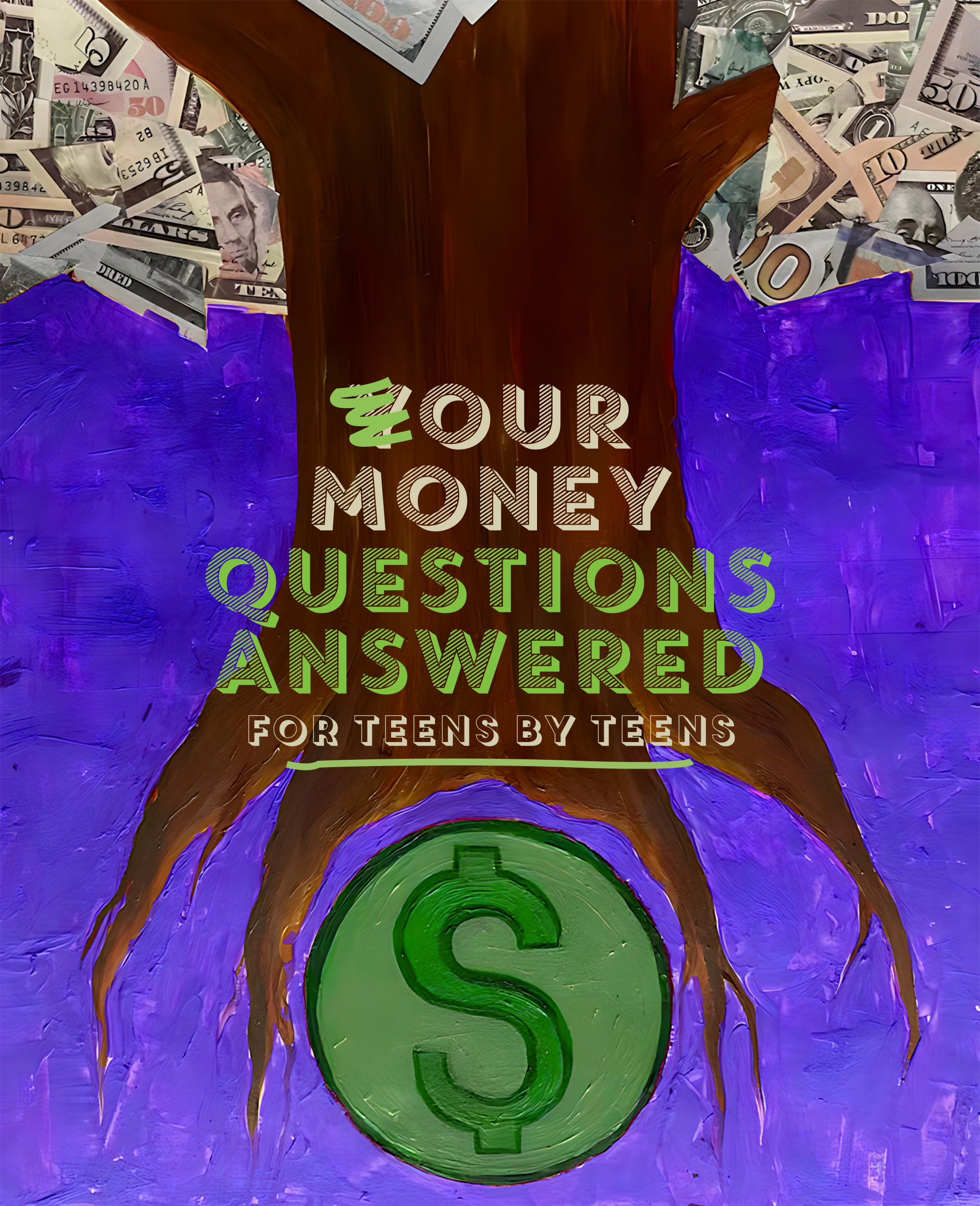By Lindsey Gaynor and Clare McAlpin
Artwork by Zoe Stevens
We’re a junior and senior in high school who attend different schools. We know we’re not the only ones lost in conversations about money, and other teens share similar questions surrounding financial independence. Neither of us learned about personal finances in school, and it feels like it should be a vital part of our curriculum. Adults around us assume we understand these basics because they do, but we had no idea where to start – the amount of information is overwhelming.
So we took the opportunity to begin understanding finances and build our financial literacy. We wanted to understand common misconceptions that could prevent us from developing proper spending habits, and we wanted to support other teens as they begin to understand money.
But instead of asking our parents because they don’t know all the answers (sorry, Mom and Dad, but it’s true), we turned to professionals to answer our pressing questions.
We spoke to Lisa Summa-Guarino, the vice president and market manager at Valley National Bank in Mount Kisco and Kurt Putnam, a middle school math teacher at Whitby School in Greenwich. Here’s what we learned.
The basics
My parents have access to my bank account information online, but I don’t. Should I ask for access, and how often should I look at my bank account?
“It’s always beneficial to have access to your bank account, and I recommend checking your information regularly,” says Summa-Guarino. “If you frequently monitor your bank account and notice an unusual transaction, it’s easier to recoup your funds when you alert your bank in a timely manner. Many teenagers have custodial accounts that allow their parents to supervise and access their child’s funds. You should start looking at your account with them once or twice a week.”
How do checking and savings accounts work?
“Your savings account tends to be where you put money to the side that you don’t necessarily need immediately,” Putnam explains. “Banks tend to pay you an interest rate on your savings because, without trying to go too deep into the financial system, banks will borrow your money to fund another person’s loan or investment. So they’ll pay you a percentage to borrow your money, but they’ll make money by charging the loaner a higher percentage than they’re giving you.”
“Checking accounts are for more immediate spending, and they are linked to your debit card and checkbook,” Summa-Guarino adds. “A common misconception is that money is immediately deducted from your checking account directly after you write a check. However, in order to transfer the money from your account to theirs, the person who received the check must first cash it.”
“The same is true for debit cards,”Summa-Guarino continues. “The transactions are processed at the mercy of the vendor. Some owners settle their accounts every day, others once a week. This is why tracking your purchases is so important; it can be deceptive while checking your account’s balance if you do not keep a close eye on it.”
What is a credit score, and how do I get one or improve it?
“A credit score solely reflects one’s spending habits using their credit cards; it’s not based on the additional use of a debit card,” Summa-Guarino explains. “It is important to use your card in moderation. It is a common misconception that, in order to have an impressive credit score, you shouldn’t use your cards. Instead, since your credit score is based on spending, it needs to build up over time with infrequent purchases. To build a cumulative score as a teen, I suggest using your card once a month on gas and then paying it off. You always want to stay under the halfway point of the line of credit you are issued. Over time, this responsible spending will build your credit score.”
“Credit scores are also built by paying your bills,” Putnam adds. “So when you pay your bills on time, your credit score will improve. The higher the credit score, the more certain a lender will be that you will pay them back.”
What money topics should we discuss with our parents?
“It’s crucial that young adults learn how to manage a checking account, log debit card transactions, write checks and understand the timeline of transactions,” says Summa-Guarino. “Money management needs to be taught, and the best people for the job are your parents.”
What is the best thing to do with the money I receive as a gift from my family?
“Ask them to donate to a 529 plan, which allows family and friends to gift into an account to build funds for college savings,” Summa-Guarino recommends. “It can be created on a teen’s behalf and managed by a financial advisor. This sets you up for success in college because loved ones can contribute a meaningful gift to your education whenever you have a birthday or holiday, preventing the young adult from struggling with larger future debts.”

Saving money and creating a budget
Is there a good way to track how much money I get or spend?
“I think apps nowadays are very good,” Putnam says. “But for myself, I regularly check my bank account; I probably go in and check my bank account twice a week to monitor it.”
(Editor’s note: Click here for a review of apps to help you track your money.)
How do I make a budget?
“When budgeting, I like to divide my earnings into three separate categories: cost of living, unexpected expenses/leisure, and savings,” says Summa-Guarino. “A third of a paycheck should go to each designated space. Personally, I request that a third of my paycheck be directly pulled and transferred into savings so I don’t have to think about it. I find that when the money is out of my hands, it is easier to save. But it’s just as important to monitor your spending as it is to enjoy life and spend a little extra on things that make you happy.”
What should a high school student include in their budget?
“For high school students, I would say that most of the money counts as discretionary spending,” says Putnam. “And by that, I mean they’re nonessential expenses, such as eating out, shopping and entertainment.”
What is the best way to create a budget in college?
According to Putnam, the first thing you should do is figure out your basic costs. These usually look different for each college student. For instance, will you live on or off-campus? Will you have a meal plan or shop at the grocery store? He emphasized that, “you’ve got to budget for the roof over your head and the food on the table. And that’s a priority.”
What are the things I should consider cutting back on to save more money?
“The largest neglected expense is eating out,” says Summa-Guarino. “Anything from coffee to a cookie rapidly accumulates and inhibits financial growth. If you sat down at the end of the month and tracked how much you spend on food, you’d probably be amazed at how much money is flowing through your hands. If you put it into a savings account, imagine how impressive the total could be.”
“Ask yourself, ‘Do I really need that right now,’” Putnam encourages. “‘Do I have to have that right now?’ Because if you can honestly say, ‘No, I don’t,’ then maybe the best decision is to save your money. You just don’t know what’s coming down the line in the future.”
Can and should we start investing as teens? If so, where do we start?
“I honestly think that young people should probably wait until they get their first job, because you’ve got a lot of living to do when you’re young,” Putnam says. “And it really takes a lot of money to start making money. You’re not going to become a millionaire because you bought one Apple share or five Apple shares. So I think more high school students should enjoy the present and really only wait until they’ve actually started working and figured out what their actual responsibilities are to see how much money they have left to start investing.”
What are the habits we should establish now?
“My biggest piece of advice is not to be afraid of budgeting,” Summa-Guarino recommends. “Embracing and understanding the flow of money in and out of your account with discipline is a skill you will always utilize. When you check your account, it should reaffirm what you already know. People are often uncomfortable with analyzing their frivolous spending, but if you are forgiving with yourself, you will develop a positive and healthy relationship with money. Since everything is so electronic now, it’s easy to misunderstand the amount you have. If you don’t learn to respect budgeting, you will lose money that could greatly impact your future.”

Understanding credit cards
Even though you must be 18 to get a credit card, and you either need to prove your income or have your parents be responsible for the payments with you, we still had questions about credit cards. We wanted to understand them now so we’d be prepared when we’re old enough to get one.
What is the difference between a debit card and a credit card?
“Your debit card is directly linked to your checking account,” Putnam explains. “It’s called a debit card because, in finance, the word ‘debit’ refers to taking money out. So when you put the card in an ATM machine and take money as a withdrawal, you debit your account. You’re also taking money out of your checking account when you go to a store and swipe your debit card. That’s simply what a debit account is.”
“As for a credit card,” he continues, “you don’t put any money onto the credit card; you just pay it back at the end of a month based on how much money you charged to your card. Credit cards do have limits, depending on your situation. So, usually, when you get your first credit card, you will have a fairly low limit, as you should, because you haven’t built up much of a credit history. Your limit will increase the longer you have your card.”
What happens if I don’t pay my full credit card bill each month?
“Each month, the company will tell you the minimum balance that must be paid, depending on the size of the line of credit,” Summa-Guarino explains. “It can be as small as $25, but interest is applied to the balance that remains on your card. If you neglect the balance, not only will it hurt your credit and inhibit your ability to apply for a future credit card, but it will also push your account into collections. Then, your credit card company will hire a third-party organization to reach out to you if you have not properly paid your bills so they can collect the amount they owe.”
“The credit card company wants you to charge unnecessary things on your card,” Putnam adds. “But they do want that money back at the end of the month. If you don’t pay it all back, they will charge you upwards of 25 to 29 percent interest. And that builds up quite quickly if you don’t pay it off.”
Is there a benefit to getting a credit card now rather than only using or having a debit card?
“As a teen, I would say no,” Putnam recommends. “Sometimes, when you’re away from home and you need something in an emergency, a credit card is probably the most useful way to get it. But again, you need to pay it off. And that’s the reason why credit limits are set very, very low for students. Because the reality is, you don’t really have a way of paying it back unless you have a job while you’re in college.”

Financial and personal safety
How do I protect my financial information online?
“Your passwords need to be something that are not easily guessed,” Putnam explains. “I know there are apps that will save time, but I’m still skeptical about their actual safety. They’re supposed to be very secure and safe in the cloud, but I worry that if somebody hacks into my cloud and gets all my passwords, I’m basically done. That person can now take money out of my bank accounts.”
“There are three credit reporting agencies: Equifax, Experian and TransUnion,” says Summa-Guarino. “These agencies allow you to monitor your credit activity as a way to protect your personal information and prevent identity theft. There is also a service called Life Lock, which locks your account and prevents unapproved financial activity. Many bank accounts also provide activity reports, which is an additional financial protection feature.”
My parents tell me I should always have cash on me. How much cash should I have?
“Only carry in your pocket what you can afford to lose,” Putnam advises.
“I would say a sufficient sweet spot is between $20 and $50,” Summa-Guarino adds. “It’s not an overwhelming sum, but it is also enough in case of an emergency. Remember, lost cash is not recoupable, so it is important only to carry an amount you can control.”
In conclusion
We learned so much writing this story, and we hope you learned a lot by reading it. If you have questions we didn’t answer, we encourage you to do some independent online research, but remember to read at least three sources to ensure your learning is correct. If you still have questions, ask a professional. As we’ve learned, their support is extremely helpful.
And we want to know if we helped you. We’d love to hear from our peers. Click here to leave us a message. Thanks!
This article was published in the January/February 2024 edition of Connect to Northern Westchester.












